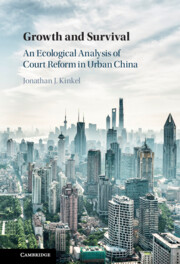Book contents
- Growth and Survival
- Growth and Survival
- Copyright page
- Dedication
- Contents
- Figures
- Tables
- Acknowledgments
- Abbreviations
- 1 Introduction
- 2 An Ecological Theory of Court Reform in Urban China
- 3 The Judicial Cadre Evaluation System
- 4 High-End Demand for Legal Services and Local Pressure to Professionalize the Judiciary
- 5 Expansions in Competitive Promotion and the Implications for Judicial Autonomy
- 6 Court Personnel, Bureaucratic Specialization, and the Limits of Top-Down Theory
- 7 Conclusion
- Appendix Summary of interviews regarding local lawyer salaries (2014)
- References
- Index
5 - Expansions in Competitive Promotion and the Implications for Judicial Autonomy
Published online by Cambridge University Press: 26 May 2022
- Growth and Survival
- Growth and Survival
- Copyright page
- Dedication
- Contents
- Figures
- Tables
- Acknowledgments
- Abbreviations
- 1 Introduction
- 2 An Ecological Theory of Court Reform in Urban China
- 3 The Judicial Cadre Evaluation System
- 4 High-End Demand for Legal Services and Local Pressure to Professionalize the Judiciary
- 5 Expansions in Competitive Promotion and the Implications for Judicial Autonomy
- 6 Court Personnel, Bureaucratic Specialization, and the Limits of Top-Down Theory
- 7 Conclusion
- Appendix Summary of interviews regarding local lawyer salaries (2014)
- References
- Index
Summary
Changes to the legal profession in the post-Mao years led to significant changes regarding courts and judicial autonomy that have been deeply intertwined with the stratification of living standards, dramatic growth of the Chinese legal profession, and emergence of significant income differentials for lawyers across urban localities, especially after 1992. This details these dynamics, which are consistent with this book’s ecological explanation of court reform, which posits that the structure and process of socio-legal forms have an interactive relationship; I also provide evidence in the second part of this chapter suggesting that these dynamics in the social forms of law influence the substance of law, for example, the decisions of court leaders in urban China to increase transparency of their courts and enhance the statutory basis of their judicial decisions. These developments also indicate expansions in judges’ overall decisional autonomy, as discussed in Chapter 1.
Keywords
- Type
- Chapter
- Information
- Growth and SurvivalAn Ecological Analysis of Court Reform in Urban China, pp. 93 - 126Publisher: Cambridge University PressPrint publication year: 2022

